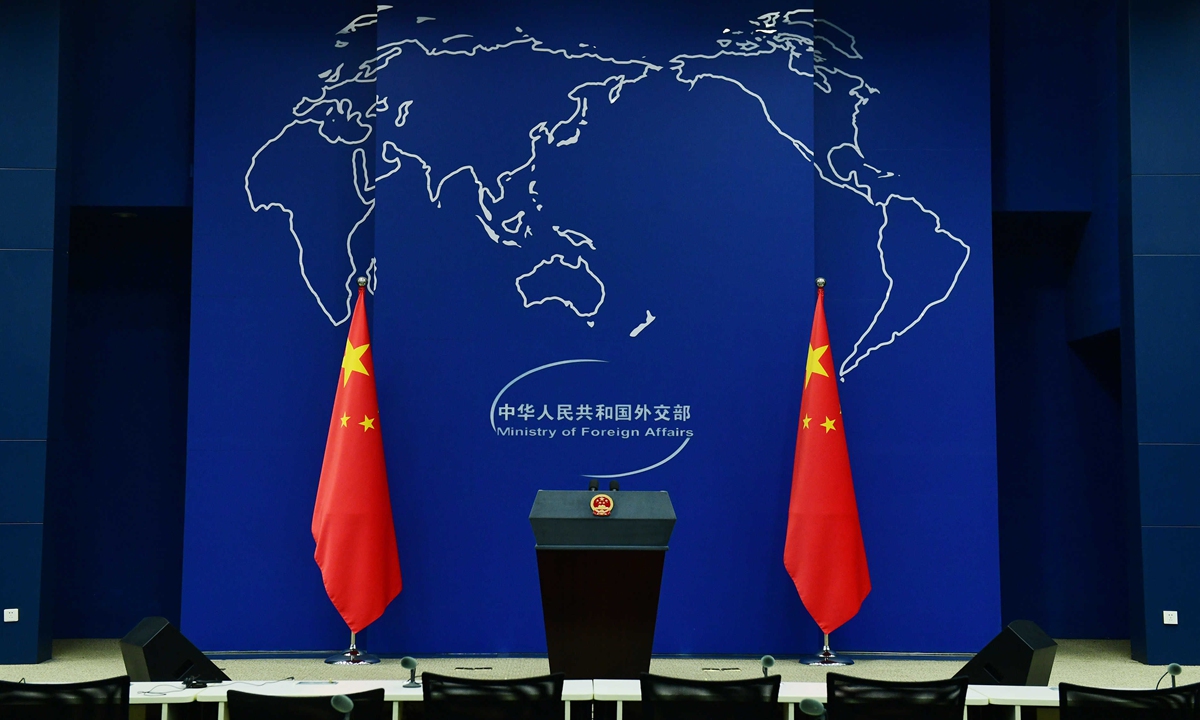China issues proposal on reform, development of global governance

Ministry of Foreign Affairs
The Chinese Foreign Ministry on Wednesday issued the Proposal of the People's Republic of China on the Reform and Development of Global Governance, with Chinese analysts saying this comprehensive and far-sighted document reflects China's ideas and stances over almost all hotspot issues worldwide, and that it is crucial for the building of a community with a shared future for mankind.
The year 2023 marks the 10th anniversary of the proposal of the idea of a "community with a shared future for mankind" by Chinese President Xi Jinping. Over the past decade, this concept has grown from an idea to action, and from a vision to reality, said the proposal, adding that China calls on the international community to act on true multilateralism, uphold the international system with the United Nations (UN) at its core, support the UN in playing a central role in international affairs, and further develop and improve the global governance system.
Detailing the proposal at a regular press briefing on Wednesday, Mao Ning, a spokesperson for the Chinese Foreign Ministry, said the international community expects the UN to play an active role in international affairs and continuously reform and improve the global governance system.
The proposal comprehensively elaborates China's stance and propositions on key areas of global governance such as peace, security, development, human rights and society, as well as on institutional reform, she said.
Experts held that in the document, China released its latest stances and proposals about the Ukraine crisis, the nuclear issues of Iran and the Korean Peninsula, the Afghanistan issue, the Palestine-Israel conflict, as well as the issues of Syria, Sudan, Libya and Yemen. These stances are different from the US and some of its Western allies, but much closer and similar to those of developing countries. This proves that China will firmly stand with the justice and fairness upheld by the majority of the international community, rather than submit to hegemony.
On the Ukraine crisis, the document said: "No one gains from conflicts and wars. Imposing sanctions, exerting pressure, or adding fuel to the fire will only escalate the situation. It is important to maintain mutual respect, abandon the Cold War mentality, stop ganging up to stoke camp-based confrontation, and work to build a balanced, effective and sustainable European security architecture."
On the Korean Peninsula nuclear crisis, the document said: "Given the current situation, parties concerned need to remain calm and restrained, work to ease the situation and make efforts to create conditions for the resumption of dialogue, rather than insisting on sanctions and pressuring, which would only aggravate problems and escalate tensions."
Li Haidong, a professor at the China Foreign Affairs University, told the Global Times on Wednesday that "currently, global governance faces huge challenges of turbulence, splits and confrontation, and in order to ensure security, stability and sustainable prosperity, we need positive, effective and well-accepted ideas for global governance and ensure they are implemented. This proposal is truly needed under the current situation."
The thinking of the US and the West on global governance is outdated and getting increasingly dysfunctional, and the ongoing turbulence around the globe is proof. The old Western-dominated rules and ideas are based on unfairness, bullying and plundering against developing countries, and these have brought huge risks to the world, and created splits and confrontations, Li noted.
"China's idea for global governance is made to counter the unfairness and imbalances," Li said.
On the Palestine-Israel issue, the document said: "It is important to keep to the right direction of peace talks, respect the historical status quo of the holy sites in Jerusalem, refrain from making radical and provocative comments and moves, promote the hosting of an international peace conference with wider participation, higher authority and greater influence, create conditions for the resumption of peace talks, and make concrete efforts to help the two states of Palestine and Israel to coexist peacefully."
China believes that regional hot spots such as the Iranian nuclear issue and the issues of Syria, Sudan, Libya and Yemen need to be resolved through political means. China supports Middle East countries in independently exploring development paths, resolving regional security issues through solidarity and coordination, and maintaining lasting peace and security in the region, said the proposal.
Wang Yiwei, director of the Institute of International Affairs at the Renmin University of China, told the Global Times that the document is not only covering the ongoing hotspot issues and long-standing geopolitical crises, but also eyes the future.
"The deep sea, polar regions, outer space, cyberspace and digital technology and artificial intelligence (AI) have become the new frontiers of global governance. Faced with the new circumstances, new areas and new challenges, we need to follow the principles of peace, development, inclusiveness and shared governance, and take active steps to keep the rules governing new frontiers up to date with the times and fully reflective of developing countries' opinions, interests and aspirations. The rights to participation, stating their views, and decision-making of developing countries should be fully safeguarded," said the proposal.
The international community should commit to upholding a cyberspace featuring peace, security, openness and cooperation, and oppose the camp-based division, militarization and fragmentation of cyberspace, the document said. "No party should overstretch the concept of national security, or unscrupulously deprive another country of its legitimate right to development. Advantage in cyber technologies should not be used to spread aggressive cyber technologies, or turn cyberspace into a new battleground for geopolitical competition," the proposal reads.
In these "new frontiers," the UN system has yet to cover them all with sophisticated rules, so it is important for China to present its stance, to stress that the new frontiers should not become arenas for major power competition and should not be weaponized and militarized. They should be shared by the whole humanity, and while now some countries are unable to enter these new frontiers like outer space, the countries with advantages should preserve and safeguard their rights, Wang noted.
Photos
Related Stories
- Beijing plays constructive role for better global governance
- Foreign minister stresses role of Global South countries
- Wang urges open, inclusive cyberspace
- The foreign relations law puts China's attitude on the table
- Law on Foreign Relations to act as safeguard
- China's diplomacy ‘confronts wolves head-on,’ gaining glorious accomplishments amid hardships
- Major-country diplomacy to grow network of friends
- Foreign Minister Qin Gang briefs the media: Highlights
- China issues Global Security Initiative Concept Paper Tue, supporting UN-led governance and rejecting hegemony
- Chinese, Afghan FMs vow to strengthen cooperation, combat terrorism
Copyright © 2023 People's Daily Online. All Rights Reserved.









